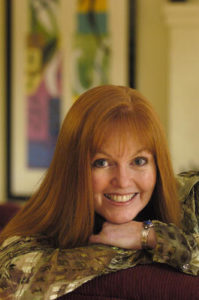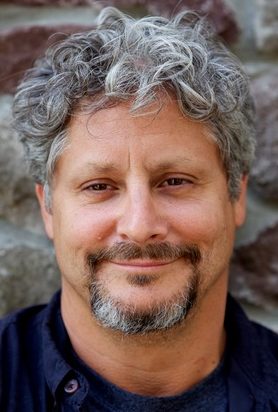By Victor Greto
MILTON — Sometimes, when Anne Colwell was a little girl, she climbed on to the upper shelf of the family’s cereal closet near the kitchen, curled herself up, and slowly plucked at and chewed on the Lucky Charms she had trapped in her tiny hand.
Outside she could hear her mother’s drunken rage, feel the silence of her father standing helplessly by.
During her subsequent life as a poet, she has clung to that image.
More than three decades later, she is curling up on a red couch in the home she shares with her husband James Keegan.
Despite long-heeled black boots and jeans, Colwell tucks her legs underneath herself, draping her upper body, covered with a form-fitting black sweater and unbuttoned green blouse, over the back of the couch.

Her face, freckled and smiling with protruding cheeks, is curtained on both sides with straight red hair.
She looks happy.
Instead of deliberately plucking bits of cereal from hand to mouth, for the past 20 years Colwell has been picking at words from a lifetime of reading and thinking, and setting them into poetic verse.
Sometimes those words shine, like the ones she is clutching now, contained in a slim chapbook filled with 21 poems about her parents that she has written, revised, cut, added to and polished for years.
Colwell, 43, an associate professor of English at the University of Delaware who teaches in Georgetown, won the Fifth Annual Dogfish Head Poetry Prize during the annual Milton poetry festival for her volume of poetry, “Father’s Occupation, Mother’s Maiden Name.”
So long as we believe they’re here, Colwell wrote in a poem called “Summons,” tucked under the first wet leaf fall/ like the blanket of their child bed –/ they come back when we come, to inhabit/ briefly the old bodies, or what’s left of them,/ humoring us…./ So my mother arrives tonight,/ lays down into the mold and bones,/ puts on her wedding ring,/ curls into what remains of shoes and toes./ She takes my grief, an elaborate gift/ she can’t use.
In the collection, Colwell contrasts the calm, ordered world of her father with the fear and chaos of her mother’s illness.
“She’s dissecting trauma, dissecting the family,” says Colwell’s friend and novelist Maribeth Fischer, “because it was so chaotic for her. She’s constantly picking the scab, the source of pain that doesn’t go away. The parents are dead, but she keeps going back.”
Colwell likes to quote early 20th-century German poet Rainer Marie Rilke. “If my devils are to leave me, I am afraid my angels will take flight as well,” the poet is quoted as saying, referring to the negative sources of his poetic inspiration.
At least so far, Anne Colwell’s poetic expression seems tied inextricably to the trauma of her youth.
Former Delaware poet laureate Fleda Brown, who lives in Michigan but who taught Colwell in the UD graduate English program, says one always grants the poet her subject.
“You write what you know best,” she says. “But the subject is not the issue. It’s the quality of the poems.”
If there’s one thing that Anne Colwell knows best, it’s the experience of growing up in a household traumatized by an alcoholic.
“If I don’t try to understand it, I don’t have awareness,” Colwell says. “I won’t have a choice.”
****
Art is all about making choices — unlike to whom one is born.
Born in Cheltenham, Pa., the first of four children to Mary Anne and Thomas G. Colwell, Anne Colwell’s family moved to Berwyn when she was very young.
They were not poor. Her father was an accountant and the chief financial officer at Crozer-Chester Medical Center, and later at St. Francis Hospital in Wilmington.
Colwell attended Catholic grade school and high school. Bookish at an early age, she read constantly, from the adventures of Sherlock Holmes and “The Secret Garden,” to Shakespeare, whose plays at first fascinated her because the family owned them in a set of little blue-bound volumes.
“You couldn’t ask for a book and not get it when I was a kid,” she says.
She was not conscious of her mother’s illness until she was 8 or 9.
A substitute teacher and housewife, Colwell’s mother was “absent a lot, upstairs in the middle of the day, sleeping.”
It was a classic alcoholic household, Colwell says.
“She’d get worse but not get violent unless we tried to stop her from getting drunk. And we did.”
I didn’t know to ask why my father/ set his daughters out, bait for his own/ monsters, his angry gods, a drunken woman/ he wouldn’t leave, Colwell wrote about her father in “Unlearning the Stars.” The wedded promise/ he couldn’t break, wouldn’t leave. The porchlight/ flicked on and off. “We have to go in,” he said,/ letting his shoulders fall, sighing, glasses/ sliding down his nose. “She’ll be mad.”
As a result, Colwell and her siblings, and she and her father, grew closer.
“We raised each other, in a way,” she says.
Her sister and two brothers would hide the car keys, guard the doors so their mother would not surreptitiously exit.
“We’d plead and yell at her, to go back to bed.”
Later, after both parents were dead and the furniture and the books were removed from the house, Colwell found keys everywhere.
Despite the recurrence of her illness and the effect it had on the children, her mother remained with her father.
“Two or three times dad would decide we were going to leave,” Colwell remembers. “We would pack up the car and start to go. But he couldn’t do it.”
If surviving in the family brought most of them closer together, it also engendered in Colwell a poetic sensibility.
Your hair is thin and dark, caught back in a scarf,” Colwell writes of looking at a picture of her mother as a young woman, in “Vacation Picture.”
You’re posing — 1940’s cheesecake: bathing suit,/ anklets, loafers, leaning back on a pole by the wharf./ Behind you the rented beach house, mute/ sky, scrub pine, synchronized tones of gray./ One hand dangles sunglasses. You rest in the absolute smile of your fifteenth year. The year before the day/ your father lay hemorrhaging on the floor,/ before you and your mother learned to pay off the debt of manlessness, before rationing, the war,/ before late night car rides, flasks, double dates, red/ lipstick, and red flashing lights, before white lace, suburbia, tranquilizers, hospital beds,/ hidden bottles, open regrets. Somewhere near you a gull cries,/ a sleepy laughing sound. Listen. Lift your head.
Lean back against the warm tarry wood. Close your eyes/ and breathe easy a moment, easy, beneath the changing skies.
“Her themes are unsettling,” says Jamie Brown, owner of John Milton & Company Books and founder of the annual December Milton Poetry Festival. “I’m amazed at the willingness of good poets to unburden themselves, open themselves up to exhibiting their inner pains and turmoil.”
****
It took a while to get there.
At first, Colwell wanted to be a doctor. Then, when she entered Immaculata College, she majored in accounting and business, with an eye toward becoming what her father was.
Less than a year after she began college, the head of the English department asked Colwell what she was doing wasting her time in the business department, why she wasn’t an English major.
She replied there was no money in it.
There always will be room in any field for what you love doing, he told her.
She loved reading and writing, but didn’t want to be a teacher, the profession her mother loved before her condition deteriorated.
Despite that, she spent the summer of her sophomore year teaching English as a second language in inner-city Philadelphia.
She loved it. She double-majored in English and Spanish. She decided she wanted to be a teacher. Like her mother.
After graduating, Colwell was awarded a teaching fellowship to attend graduate school at the University of Delaware.
For the first time in her life, she moved out of the house in the fall of 1986 to live in Newark. It was at UD where she met Fleda Brown and her future husband, James Keegan, who also became an English professor.
Less than a semester after she left home, her mother fell while drunk and hit her head.
Mary Anne Colwell’s liver and kidneys soon failed. She died at the age of 54.
The funeral director asked the children gathered around the table at the funeral parlor if their mother’s death was sudden, or had been a long time coming.
“Two of us answered it was sudden, the other two that it was a long time coming,” Colwell says. Then she laughed, feeling relieved and hopeful.
It’s a child’s point of view, she admits now.
“You think that, if only this thing will get fixed, we’ll all be happy,” Colwell says.
When it was “fixed” with her mother’s death, she also felt anger.
“Why does sobriety happen for some but not for my mom?” she asked herself. “There was relief, but irredeemable loss. I had failed.”
****
Colwell has been teaching English at the University of Delaware for 16 years.
She has written short stories, three of which have been published, as well as a couple of unpublished novels.
But poetry is her main craft, she says.
“It’s emotional,” she says. “It’s the most concise form in which to deal with things that are too hot to handle in others.”
Maribeth Fischer has noticed that Colwell’s poetry has become more minimalist as time goes by.
“She almost gives the reader too much credit to figure out what’s going on,” Fischer says. “There’s an emotional thing that I don’t get, that I want her to explore further.”
In her chapbook of poetry, longer narrative poems brush up against terser ones.
“I enjoy that in a poet,” Fleda Brown says, “when they surprise me by moving away from where they were and doing something radically different. It means she’s trying lots of things.”
Unlike the main subject of her chapbook, her form of poetic expression continues to mature.
Colwell says she began writing about her parents in high school.
“I don’t know if I’ll ever be done with the subject,” she says.
“This is where we come to pay,” Colwell writes in “Another Waiting Room.”
Where I come to say “My mother died drunk./ My father did the best he could./ I’ve been fooling doctors like you/ since I was twelve, but find/ I’ve no where else to turn.”/ Like a faithless pilgrim who has come to the shrine/ on her knees, I’m waiting for a miracle/ I won’t believe./ Or maybe I’m closer than I know to where I began./ And it’s a cavity I’ve come to fill….
